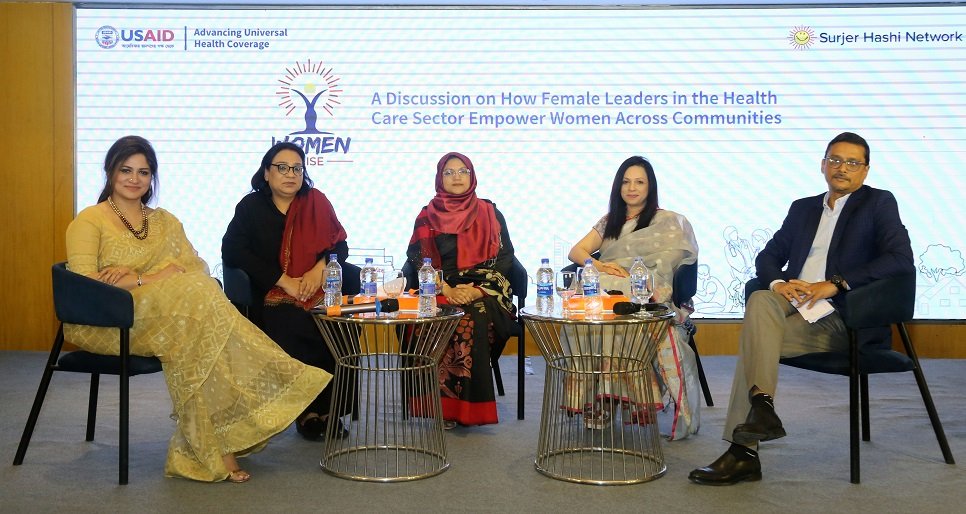
To celebrate the astonishing contribution of women leaders in the Bangladeshi Health sector, USAID’s AUHC activity and Surjer Hashi Network (SHN) jointly organised a discussion to celebrate female champions in the health sector and discuss the healthcare sector’s contribution to empowering women in Bangladesh.
The panel discussion took place in the Ball Room of The Amari Hotel on Tuesday (March 14). Some female leaders who have made contributions to the healthcare sector were present at the discussion.
Shaila Purvin, Chief Executive Officer (CEO) of Surjer Hashi Network, Parvez Mohammad Asheque, Chief of Party, USAID AUHC project, the facilitator of the panel discussion, Professor Rubina Hamid, chairperson of the SHN Board of Directors, Dr. Farhana Akhter, Project Management Specialist (Maternal and Newborn Health) USAID/ Office of Population, Health and Nutrition, Zahida Fizza Kabir, CEO, Sajida foundation, Rubaba Dowla, CEO Pulse digital healthcare, MD & CEO – Oracle Bangladesh along with other USAID representatives, prominent guests from the development, humanitarian, and donor organizations private foundations, start-ups, and SHN staffs were present at the Discussion.
Professor Rubina Hamid, Chairperson of the SHN Board of Directors said, ‘It goes without saying that women work side by side with the men but now we have proved to contribute in a bigger manner in all the sectors not only in the health care sector. So it’s a nice way to celebrate our women’s contribution but there will be a day coming when we will celebrate Men’s Day too. The clinic managers of all the Sujer Hashi Network are the true champions. I appreciate their service and contribution to empowering the marginalized women of Bangladesh in different communities.’
There was a crest-giving ceremony conducted by Shaila Purvin, Chief Executive Officer (CEO) of Surjer Hashi Network and Professor Rubina Hamid, Chairperson of the SHN Board of Directors to honor five Surjer Hashi Clinic Managers of different branches. The managers who got awards are- Rikta Roy, Rowshan Ara Khanom, Rebeka Sultana, Afsana Khatun and Sultana Begum.
After the ceremony of honoring Clinic managers with crest, the panel discussion started with the four panelists- Zahida Fizza Kabir, Dr. Farhana Akhter, Shaila Purvin, Rubaba Dowla and host Parvez Mohammad Asheque.
Zahida Fizza Kabir, CEO, Sajida Foundation stated during the discussion, ‘the world I’m involved with working I see many community health workers going around villages and impacting thousands of lives.
“Women caregivers, workers, and nurses are mostly so humble and come from a good background with minimal education yet make difference in other people’s lives and are so confident. So these kinds of moments are very rewarding but each time I also feel that there’s a lot more need to be done. Those are the women’s who are coming forward despite of the challenges that they have which satisfying and encouraging.”
Dr. Farhana Akhter, Project Management Specialist, USAID/ Office of Population, Health and Nutrition said, ‘It is indeed impactful to see 50 years since the independence when women and children have healthcare services in their community for the first time. I am proud of the work I am doing in terms of making difference in the availability of healthcare services across the country. Of course, there is a lot more work to be done. It is exciting to see USAID, the Ministry of Health and Family welfare, community, local and governments how cooperating with each together to build the health service sector more precisely.”
Shaila Purvin, Chief Executive Officer (CEO) of Surjer Hashi Network said, “Women are powerful. Once the platform is there and we take on responsibility, we do it well and take care of our work and our children. We don’t plan on stopping to care, we will move forward with our women. The contribution of women in the healthcare sector is immense as can be observed not only in SHN but healthcare overall in Bangladesh. Most of the staff of Surjer Hashi Clinics are women and we have been working with them continuously for a long time without any obstacles.”
Rubaba Dowla, CEO, Pulse digital healthcare, MD & CEO – Oracle Bangladesh said, “If talk about the challenges of fostering female leaders and I was to sum it up into a few points I would say the first would be the unconscious bias that we have. None can’t make judgments or decisions on the basis of our prior experience, our own personal deep-seated thought patterns.”
“So women have to sacrifice something at some point because you can never have a 50-50 balance in life always between family and work. The second thing would be I want to give equal opportunity but where is the pipeline? If I am hiring I want equal numbers of applicants but what I see is 1 woman while there are more than 10 men applicants. So we have to work for the pipeline from the school level. Thirdly, women need to do networking, look at how men are networking. So women must build and keep in with networking.”
There was an open Q&A discussion round where the floor was given to the audience to ask questions to get involved and participate. Also Parvez Mohammad Asheque, The facilitator of the panel discussion asked a few questions the panelists about their thoughts, their stories, their contribution, and their achievements how from being in a different industry these women joined the health sector, how they emerged into becoming something to help the women community.
‘Women Rise’ presented by USAID’s Advancing Universal Health Coverage (AUHC) in Bangladesh implemented by Chemonics International Inc. AUHC’s mandate is to contribute to universal health coverage in Bangladesh through a sustainable and vibrant private sector healthcare network. With that in view, AUHC has been supporting the establishment and strengthening of the ‘Surjer Hashi’ Network in Bangladesh over the last five years under this USAID-supported activity.
 Weekly Bangla Mirror | Bangla Mirror, Bangladeshi news in UK, bangla mirror news
Weekly Bangla Mirror | Bangla Mirror, Bangladeshi news in UK, bangla mirror news







